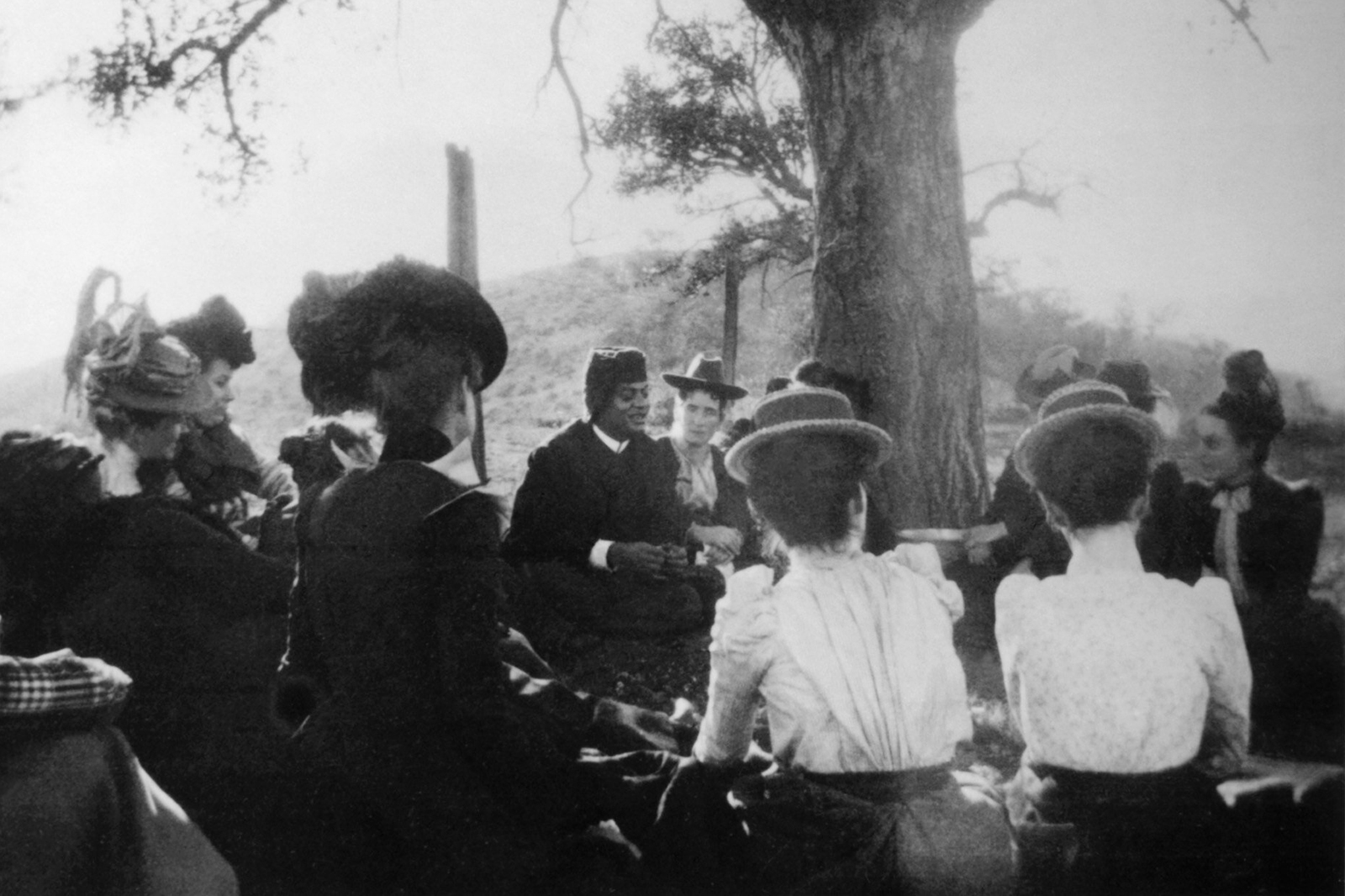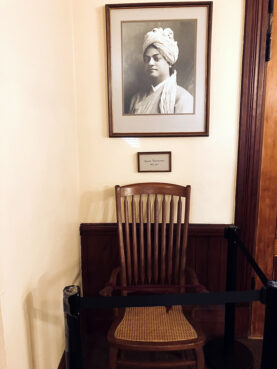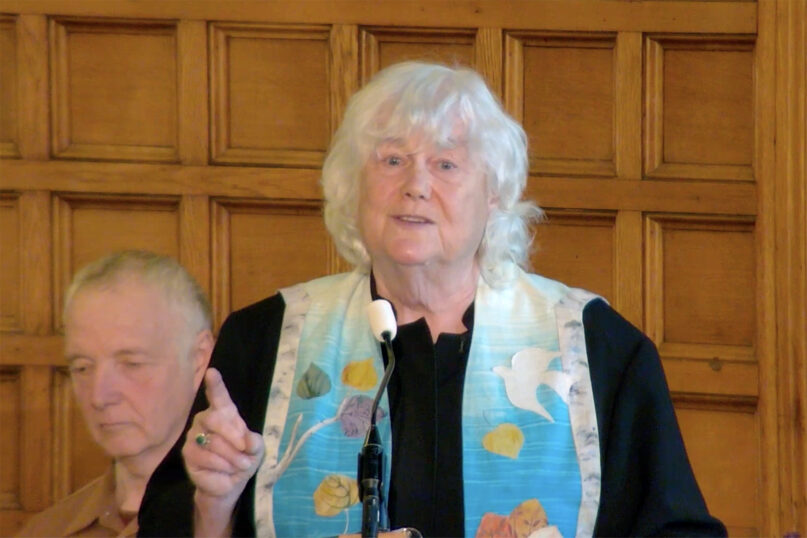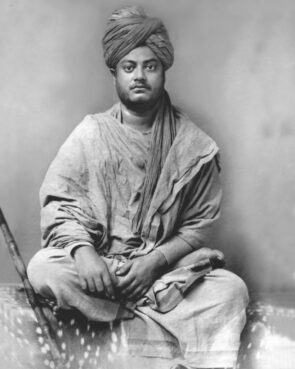
(RNS) — The first that the vast majority of turn-of-the-20th-century Americans heard of Swami Vivekananda was the speech the 30-year-old Hindu delegate gave at the Parliament of the World’s Religions in 1893 in Chicago. Vivekananda captivated his audience, addressing them as his “sisters and brothers,” and spoke about Hinduism’s teachings of the “oneness of existence” — heralding a spiritual revolution in the West.
It wouldn’t be the last Americans heard of the Indian monk and disciple of the guru Ramakrishna. Seven years later, Vivekananda would return, traveling exclusively on the West Coast to deliver lectures to thousands of Californians. His evangelism would come to an end with his untimely death at 39, in 1902.
But his stamp is still felt in the state where, he explained in his writings, “he gave his best.”
“He is our brand,” said Swami Prasannatmananda, swami-in-charge of the Vedanta Society of Berkeley. “His name is enough.”
On Saturday (Feb. 22), the Vedanta Society of Berkeley, in partnership with the Indian consulate in San Francisco, will kick off a yearlong celebration of Vivekananda’s impact 125 years after his visit. The inaugural event, a discussion among various faith leaders, will be held at the historic First Unitarian Church of Oakland, where Vivekananda delivered eight lectures during his visit in 1900.
“I personally consider that place as a place of pilgrimage,” said Prasannatmananda.

A chair used by Swami Vivekananda, below his portrait, at First Unitarian Church of Oakland. (Photo by Laurel Liefert)
Inside the church a plaque on the pulpit from which he spoke and a chair where he sat mark his visit there on Feb. 25, 1900. He appeared at the invitation of the Rev. Benjamin Fay Mills, the church’s spiritual head at the time, who had heard Vivekananda at the 1893 parliament. All eight lectures were given to packed audiences of more than 2,000, with 500 more listeners lined up outside the door.
“My understanding is that at that time, our church was the only venue in Northern California that would have allowed him to speak,” said the Rev. Laurel Liefert, Mills’ successor at First Unitarian today. “1900 is a long time ago, so that’s amazing. That is just so powerful and very in keeping with who we want to be in the community.”
“Where is the solution of this world?” Vivekananda asked the crowds. “Those who look outside will never find it; they must turn their eyes inward and find truth. Religion lives inside.”
Liefert said she didn’t know much about Vivekananda when she came to the church. That didn’t prevent her from feeling a “kinship” with him, she said. “When I picture Vivekananda in our pulpit, I picture that he’s just emanating light,” said Liefert. “For me as a minister, I always feel like I’m an instrument of something that is coming through me. And I just can’t even imagine what an instrument he was.”
Liefert, who preaches to Buddhists, Sufis, atheists, agnostics, humanists and pagans in her congregation, said that much of Vivekananda’s message overlaps with the “radical hospitality” of the Unitarian Church and his idea that, while there are many paths, everything leads to the divine.

The Rev. Laurel Liefert speaks at First Unitarian Church of Oakland, Sunday, Feb. 9. 2025. (Video screen grab)
Sarah Watts, a member of the First Unitarian congregation and choir, agreed the denomination owes a debt to Vivekenanda and other Eastern spiritualists whose words influenced the faith’s forefathers. “I am proud of a lot of the things that Unitarian Universalists have done in the past, standing up and saying, ‘Hey, you know what? The way we do things? You know we could do it differently, or look at it this way.'”
Watts says this is what led her to the church: the idea that “I can have the beliefs I have, and other people can have theirs, and we can be in conversation. We can support each other.”
In his day, Vivekananda was asking predominantly Christian Americans to coexist peacefully with other faiths. ”Now we’re thinking we need to go beyond tolerance, and try to seek something deeper, like understanding,” said Liefert. “I think that if he was alive today, he would get that right.”
Prasanna Vengadam, a professor of English at Laney College and devotee of the Vedanta Society, said Vivekananda’s 1900 trip was unlike any before that time or, she believes, since. “There has been no Hindu who’s commanded this much respect, who’s given the most beautiful teachings, as Swami Vivekananda has, and I want to absolutely adore that,” said Vengdam, who made a presentation on the importance of interfaith understanding at the 2006 Parliament of the World’s Religions. “He’s given our community members here a strong foothold to stand on and to take pride in ourselves.”

Swami Vivekananda in Jaipur, India (circa 1885 – 1895). (Photo courtesy Wikimedia/Creative Commons)
Vengadam, who immigrated to the United States in the 1980s, says Vivekananda gave her the language to talk about her own beliefs, which were influenced by the Hindu family she was raised in and her years of schooling in a Catholic convent school in Chennai, India.
Most importantly, she said, his teachings pushed her into a life of service outside of the temple: to see God in everyone around her.
“He cannot be a ‘best kept secret,'” said Vengadam. “He cannot just sit in books. So at timely intervals, we’ve got to bring him out and say, ‘Hey people, we’ve got these teachings. Come over and listen to them. Please read this. Please know this. So reviving what he taught so that more people can gain more fulfillment and advancement in their own spiritual paths.”
